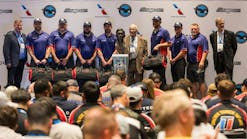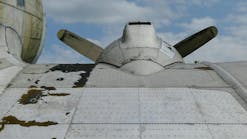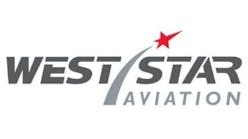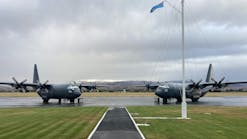Fuel Tank Sanitization Breaks the Vicious Circle of Microbial Fuel System Contamination
At this year’s European Business Aviation Conference and Exhibition (EBACE) in Geneva, Lufthansa Technik will launch a novel fuel tank sanitization procedure, a holistic and chemical-free solution for the health management of aircraft fuel tanks, especially those of larger business jets. The technology developed in-house is aviation-certified and provides a tank sanitization solution far superior to standard cleaning procedures described in most aircraft maintenance manuals (AMMs) today.
Especially for operators of larger VIP and business jets with extended ground times in hot and humid regions, the build-up of microbial contamination in structural fuel tanks can pose a major concern regarding the health of fuel system components and the tanks’ structural integrity. Problems are usually attributed to the formation and aggregation of so-called biofilm inside the tanks that can lead to fuel filter clogging and corrosion. Current state-of-the-art methods have shown to only temporarily and partially remove this sticky biofilm and may involve the use of chemical biocides hazardous to the environment.
Lufthansa Technik’s fuel tank sanitization technology, in contrast, effectively tackles the cycle of recurring biofilm contamination by providing a long-lasting removal solution, which is aviation-certified through the approvals of the company’s Part 21J Design Organization and currently patent pending. The new procedure can be applied during an aircraft’s regular maintenance layover and works with a combination of steam cleaning and vacuum suction that reliably removes the biofilm even in geometrically challenging spaces such as rivet joints. What makes the solution truly holistic are the included post-treatment microbe examinations in numerous critical areas of the fuel system. Measuring microbial contamination levels significantly lower than mandated in the AMMs, the fuel forensics experts in Lufthansa Technik’s Central Laboratories in Hamburg already clearly demonstrated the effectiveness of the procedure.
“Several thousands of filter components have already passed through our fuel forensics unit. Therefore, we have built-up comprehensive expertise and a large database of contaminants that can arise in jet fuel and its tanks today. In other words: We know exactly what to test for,” said Dr. Christian Siry, head of Lufthansa Technik’s Central Materials Technologies Unit. “The complete absence of microbes documented in all the areas treated by our new sanitization procedure has thus convinced us that we found a truly effective solution to break the vicious circle of fuel-tank contamination. Moreover, we hope that this can finally show a potential pathway to get rid of the environmentally challenging biocide treatments still mandated in AMMs today. We are therefore looking forward to entering fruitful discussions with the industry to advance our solution.”





